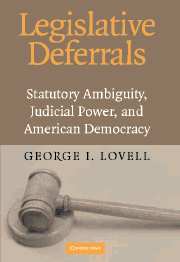Book contents
- Frontmatter
- Contents
- Acknowledgments
- Preface
- 1 Rethinking Judicial Policy Making in a Separation of Powers System
- 2 False Victories: Labor, Congress, and the Courts, 1898–1935
- 3 “As Harmless as an Infant”: The Erdman Act in Congress and the Courts
- 4 Killing with Kindness: Legislative Ambiguity, Judicial Policy Making, and the Clayton Act
- 5 The Norris-LaGuardia Act, for Once: Learning What to Learn from the Past
- 6 Legislative Deferrals and Judicial Policy Making in the Administrative State: A Brief Look at the Wagner Act
- 7 Conclusion
- Reference List
- References
- Index
2 - False Victories: Labor, Congress, and the Courts, 1898–1935
Published online by Cambridge University Press: 14 July 2009
- Frontmatter
- Contents
- Acknowledgments
- Preface
- 1 Rethinking Judicial Policy Making in a Separation of Powers System
- 2 False Victories: Labor, Congress, and the Courts, 1898–1935
- 3 “As Harmless as an Infant”: The Erdman Act in Congress and the Courts
- 4 Killing with Kindness: Legislative Ambiguity, Judicial Policy Making, and the Clayton Act
- 5 The Norris-LaGuardia Act, for Once: Learning What to Learn from the Past
- 6 Legislative Deferrals and Judicial Policy Making in the Administrative State: A Brief Look at the Wagner Act
- 7 Conclusion
- Reference List
- References
- Index
Summary
In a floor speech just before the House passed an early version of the Erdman Act in 1898, Representative Joseph Walker (R-MA) called the bill “the first step in a long line of legislation by which the twentieth century is to be ushered in.” Walker claimed that the new law would be the first piece of federal legislation to “recognize and make lawful and legal the ‘labor organizations’ of this country” (31 Congressional Record 4648).
Walker was right that the Erdman Act was the first step in a larger incremental process through which labor organizations would be released from a state of “semi-outlawry” (Forbath 1991, ch. 4) and eventually receive recognition from the government as legitimate aids to economic stability. Over the next four decades, Congress passed several additional labor statutes that addressed the legal status of labor organizations and changed the way the government regulated workers' efforts to exert economic power through collective activities. The struggles that accompanied those legislative changes gradually ended the long-standing practice of allowing judges to assume primary responsibility for regulating workers' collective actions and worker organizations.
Because subsequent chapters of this book focus on small details from my four case studies, the important broader story of institutional and political change that takes place over the time period covered by all four cases can be difficult to see.
- Type
- Chapter
- Information
- Legislative DeferralsStatutory Ambiguity, Judicial Power, and American Democracy, pp. 42 - 67Publisher: Cambridge University PressPrint publication year: 2003



